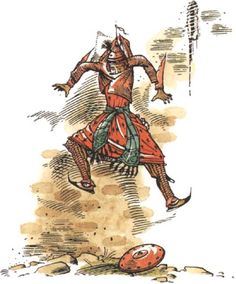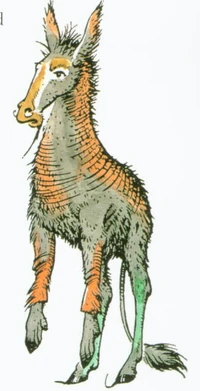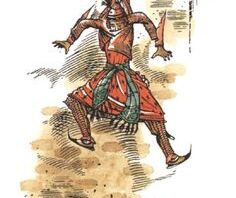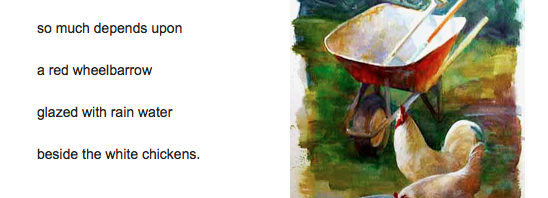
This post is spawned from two sources. First of all, I’ve been watching a lot of Cinema Therapy on Youtube and secondly, I’ve been listening to the Chronicles of Narnia with the kids. I started them off on The Lion, The Witch, and The Wardrobe and decided to follow that up with The Horse and His Boy since that’s chronologically similar and has some of the same characters.
I enjoy the books a lot although there are some parts that age interestingly- C.S. Lewis is very of his time in his portrayal of the girls, for example; he lets them have strength and independence but also limits their roles in fights and so forth. There’s also the fact that making the empire that’s used as the bad guys very Middle-Eastern coded is problematic. Maybe it would be less of an issue if more of them were like Aravis but every Calormene we see or is named is either unkind, like the fisherman who mistreats Shasta or the guard at the gates who’s just casually cruel, silly like Lasaraleen, or scheming and awful like the Tisroc, Rabadash, or Ahoshta. He also presents the Narnian stuff as just inherently better all the time. I don’t think it’s a book-breaking deal, just something I want to point out and notice so that I don’t let myself fall into similar traps hopefully. That’s not what I want to discuss now, however.
We recently passed the part where Aravis and Lasaraleen were accidentally stuck in a room with the Tisroc as he, Ahoshta, and Rabadash discuss the disappearance of the Narnians, especially Queen Susan, and the blot of “Free Narnia” and Arkenland on the edges of the vast Calormen empire (although Free is an interesting word when they’re ruled by kings, but that’s again a different discussion). Rabadash proposes going at once to take over Arkenland, going on to Narnia, taking Susan from the boat as she lands, and carrying her away back to Calormen. They say that once Susan is back in Calormen, her royal siblings won’t come for her because that risks war, and anyway they can write letters saying she’s so happy where she is and that ought to satisfy them. And that the Narnians might forgive Rabadash for his impulsive move, brought on as it is by young love.
So now I pull out my armchair (theater chair?) CinemaTherapist. Rabadash. That’s not love. That’s selfish infatuation. Susan herself said she was kind of interested in him in Narnia when he was acting gentlemanly and kind, but when they came to visit him she found him to be cruel and controlling and that’s why she was leaving. Look, guys. If someone feels like they have to sneak their entire household away from you in the middle of the night, something’s wrong in the relationship. And it’s not on the side of the person sneaking away.
Obviously C.S. Lewis wasn’t writing this as an example of a healthy romance, but some people still do confuse these gestures as romantic. Aww, you can’t turn him/her away, look, they took over a whole kingdom just to be close to you. But here’s the thing. Don’t mistake this. If you love someone, you don’t ignore what they want. Even if what they want is not you, or is actively to not be with you. Pursuing a relationship despite someone’s insistence that they’re not interested is foolish at best and at worst leads to terrible outcomes. A relationship requires all parties involved to be invested, otherwise it’s basically kidnapping.
One of the most terrifying movies I ever saw was a French film He Loves Me…He Loves Me Not. It shows the story of a woman having an affair with a doctor who she knows will leave his wife to be with her, but when she’s waiting for him at the airport to fly away with her, he never shows up. Then we see his side of the story. He gave her a rose once as he was so excited his wife was pregnant he was handing out flowers to everyone. After that, he kept receiving mysterious gifts but never knew who it was from. Things escalate dangerously but the point is he never even knew who she was. I still remember the shudder I felt at the end of that. And I hear songs going “I would do anything for you and you don’t even notice me.” That’s not a relationship! That’s not love! That’s selfish infatuation that’s hurting both people.
The thing about this is most of these instances (except for the movie) present it as romantic to keep being attached. A Don Quixote pining for Dulcinea. Romantic and sweet and sorrowful. Right? Nope. It’s not. And I think C.S. Lewis does portray this if you’re reading it between the lines; even when I asked my kids if Susan’s siblings would leave her in Calormen like the Tisroc and Rabadash said they would, they shouted an enthusiastic “No!” But if we keep portraying it as noble and romantic and frankly possible to wait them out and receive your reward at the end, more people are going to think it actually is romantic and keep it up. Which leads to frustration, agony, and can seriously negatively affect the safety of the object of this misguided affection. How many people have been assaulted or hurt because someone felt they were owed love and attention by someone who was unconnected to them?
So don’t be a Rabadash. Don’t write a Rabadash as anything but what he really is: A donkey.

Intellectual Property of Elizabeth Doman
Feel free to share via link
Do not copy to other websites or skim for AI training



